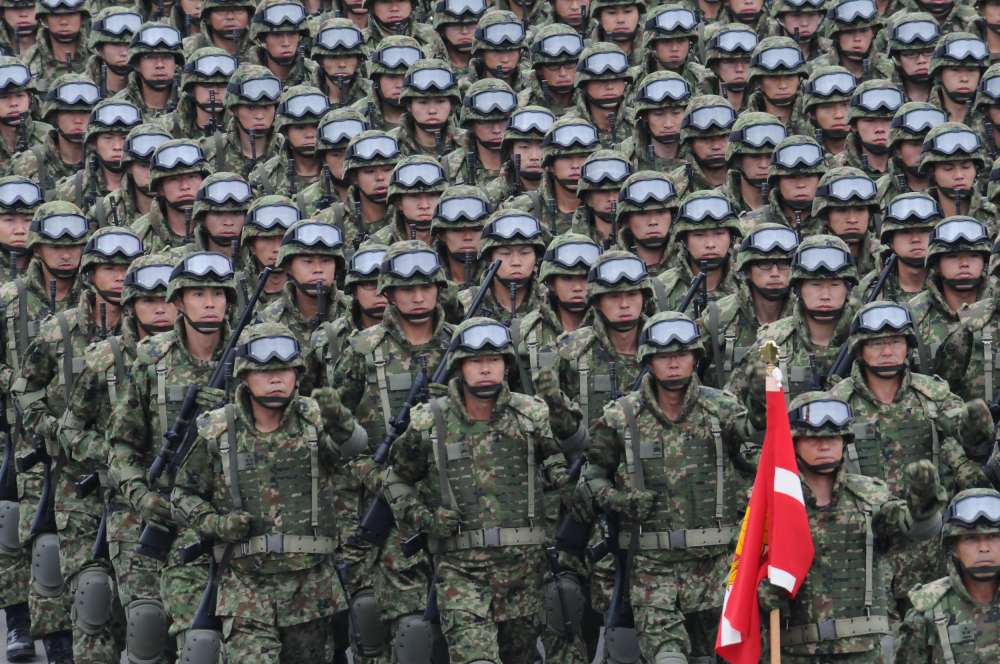The Mind Is a Battlefield: Lessons from Japan's Security Policy on Cognitive Warfare
The cognitive domain is the new frontier of modern warfare. What are the lessons learned from Japan’s new security policy on how to thwart cognitive attacks?
The realm of human cognition is a new battlefield in modern warfare. As some nations utilize sophisticated techniques to manipulate the perceptions of their adversaries’ population and key decision-makers, the rise in so-called ‘cognitive warfare’ presents a daunting challenge to national security worldwide.
Japan’s new security policy offers a valuable case study for democratic nations seeking to address the threat of cognitive warfare. On December 16, 2022, Japanese Prime Minister Fumio Kishida’s administration released three strategic documents: Japan’s National Security Strategy, National Defense Strategy and Defense Buildup Program. These documents outline the security challenges facing Japan as well as Tokyo’s plan for addressing them in the coming decade. Notably, the documents emphasize that Japan will strengthen its “ability to respond to information warfare in the cognitive domain,” reflecting the country’s concern over China’s expanding approach to cognitive warfare and its importance for national security.
As Germany develops its first National Security Strategy, it should heed the many lessons learned from Japan’s security policy to better counterbalance cognitive warfare.
What Is Cognitive Warfare?
The cognitive domain, which encompasses emotions, beliefs, values, and other intangible aspects of human cognition, has emerged as a crucial front in today’s wars. China’s People’s Liberation Army (PLA) recognizes the strategic importance of cognitive factors in winning information wars, and has devoted considerable research to this area: they aim to gain superiority in the cognitive domain by influencing public opinion, applying psychological pressure on key figures and ultimately influencing decision-making to win wars with minimal cost – or even without fighting. This perspective has been integrated into Beijing’s military strategy, with the concept of “intelligent warfare” appearing in its 2019 defense white paper. In intelligence warfare, the cognitive sphere is regarded as the seventh operational domain alongside the more traditional land, sea, air, space, electromagnetic, and cyber landscapes.
» The cognitive domain, which encompasses emotions, beliefs, values, and other intangible aspects of human cognition, has emerged as a crucial front in today’s wars. «
Furthermore, senior officers of China’s PLA have recently recognized the cognitive domain as more than just a single operational arena. Guo Yunfei, President of the PLA’s Information Engineering University, has stated that future conflicts between major powers will take place in the cognitive domain. Similarly, the PLA’s former Deputy Chief of Staff Qi Jiguang noted that operations have expanded from mere physical conflicts to also including information and cognitive attacks, and went on to emphasize that wars have shifted focus from territorial acquisition and enemy elimination to gaining hearts and minds and maintaining social stability. These remarks indicate that China regards the cognitive domain not only as a component of modern warfare, but also as the center of gravity that decides the outcome of war.
In light of this new understanding of conflicts, Chinese military theorists have also adopted a more comprehensive perspective on cognitive warfare. Li Minghai, a professor at China’s National Defense University of the PLA, defines cognitive warfare as “a new form of warfare that employs integrated military, economic, political, public opinion, psychological, legal, and narrative resources to influence the target’s cognitive functions, altering their decision-making and actions in order to achieve national security goals.” This understanding of cognitive warfare goes beyond the mere dissemination of false or manipulated information, and instead portrays it as a comprehensive form of warfare that involves the full deployment of a state’s resources to achieve supremacy in the cognitive domain. An article published in the PLA Daily in December 2022 supports this perspective by emphasizing the need to merge cognitive attacks with “hard strikes” using military force. For instance, in the early stages of a conflict, a targeted missile attack on a military base in a highly populated area – coupled with widespread dissemination of graphic footage of the attack via the internet – may instill a sense of anxiety and insecurity in the enemy population and discourage them from continuing the war. In this sense, cognitive attacks can be utilized in conjunction with attacks in other spheres to magnify their impact.
China and Taiwan
This evolving approach in cognitive warfare was clearly demonstrated in China’s response to US House of Representatives Speaker Nancy Pelosi’s visit to Taiwan in August 2022. On July 19, 2022, China’s Foreign Ministry Spokesperson Zhao Lijian said that China would take “strong and resolute measures” should the US House Speaker proceed with her trip to Taiwan. In line with this statement, China launched a massive information and cyber campaign against Taiwan, targeting government offices and critical infrastructure. On August 2, the day of the US Speaker’s visit, cyber-attacks against the Taiwanese government peaked at 15,000 gigabytes – a massive increase of over 23 times the previous single-day record. Chinese state-controlled media amplified this message through official broadcasts and warnings on national television across the country. On August 3, digital screens in various stores and a train station in Taiwan were suddenly hacked, displaying messages that condemned Pelosi’s visit and implied that a robust response from China would ensue. To demonstrate the credibility of these warnings, China also employed military intimidation. In the weeks following the visit, Beijing conducted large-scale exercises in Taiwan’s vicinity involving warships, drones and aircrafts. To further heighten the sense of tension, China launched missiles from the mainland, simulating a potential invasion. Chinese state actors also leveraged social media platforms, spreading fake images and videos suggesting that a large number of Chinese soldiers were gathered across the Taiwan Strait – creating the impression that Beijing was already prepared for a landing operation in Taiwan.
» China regards the cognitive domain not only as a component of modern warfare, but also as the center of gravity that decides the outcome of war. «
In its series of countermeasures, China conveyed a clear message: if Taiwan aligns itself with the United States, China will resort to strong measures, including military intervention. Insights into the impact of Beijing’s campaign can be gleaned from Taiwan’s public opinion polls at the time: One survey found that 17.2 percent of respondents viewed China’s military exercises as a threat, and 24 percent did not welcome the visit of Pelosi. These results suggest that China’s countermeasures created a limited, but non-negligible division in the public opinion of Taiwan, which is evidence that the potential risks of cognitive warfare should not be underestimated. By learning from these exercises, China will likely refine its strategies and tactics, posing an even greater threat in the realm of cognitive warfare in the future.
This example represents just the tip of the iceberg of the growing threat posed by cognitive warfare. As the importance of the cognitive domain continues to escalate, control over the perception of citizens, political leaders, military commanders, and soldiers has become a primary operational objective, rather than merely a means to support missions. Given this reality, how should governments respond to the threat of cognitive manipulation?
» China will likely refine its strategies and tactics, posing an even greater threat in the realm of cognitive warfare in the future. «
Japan’s New Security Policy
Japan’s recent adoption of a new security policy provides valuable insights into how democratic states can tackle the emerging threat of cognitive warfare. The Kishida administration’s three strategic documents demonstrate a cross-departmental and integrated approach to addressing the challenges posed by this form of conflict. Japan’s National Security Strategy – its highest policy document for national security – outlines the creation of a new entity within the government to collect and analyze disinformation originating abroad, improve external communication, and enhance cooperation with non-governmental organizations. The security strategy also emphasizes the significance of strategic communication and its implementation across government agencies.
Japan’s National Defense Strategy, which outlines the means and approaches for achieving Tokyo’s national defense objectives, recognizes the pivotal role that the “superiority of the decision-making process” plays in guaranteeing effective operations of the country’s Self-Defense Forces in rapidly changing and complex combat environments. Based on this, the defense strategy calls for the reinforcement of command, control and intelligence-related functions as one of the seven key capabilities for defense. Further, the National Defense Strategy specifically highlights Japan’s plan to develop its intelligence capabilities to counter hybrid and integrated information warfare, with a focus on the cognitive domain, by 2027.
In addition, the Defense Buildup Program provides a more in-depth description of these intelligence capabilities. This program outlines the creation of new systems within the Defense Intelligence Headquarters, which plays a critical role in the Self-Defense Forces’ response to integrated information warfare. The new systems will collect and analyze open-source information regarding trends in other countries and automatically collect data from social networking platforms to validate the credibility of the information. Furthermore, the systems will have forecasting capabilities, enabling predictions about different security situations pertinent to Japan. The Defense Buildup Program also notes that the Information Department of the Self-Defense Forces will enhance its information acquisition, analysis and dissemination capabilities, and new units will be established within the Ground and Maritime Self-Defense Forces to handle cognitive warfare at the operational and tactical levels.
Key Points:
- Cognitive warfare to manipulate the perceptions of adversaries is quickly becoming a key part of modern wars – especially for China.
- To combat China’s increasing cognitive attacks, Japan has implemented a cross-cutting security strategy focusing on the cognitive domain. For its upcoming security strategy, Germany should learn from Tokyo’s example.
- To safeguard citizens from cognitive warfare, Germany should prioritize disseminating factual information, while simultaneously creating a transparent system that engages all segments of society.
Japan’s measures against cognitive warfare are not limited to its Ministry of Defense: the Ministry of Foreign Affairs is also taking steps to address this new form of conflict, including information warfare, as one of the four priorities in its 2023 budget. The budget includes an allocation of 47.9 billion yen (approx. 332.5 million euro), with 210 million yen (approx. 1.5 million euro) earmarked for monitoring and analysis in social networking platforms. Japan’s 2023 fiscal planning also includes a significant increase in the budget for the use of artificial intelligence (AI) to analyze international affairs, from 80 million yen (approx. 555,400 euro) in 2022 to 140 million yen (approx. 1 million euro) in 2023. Japan’s Chief Cabinet Secretary Yoichi Matsuno has also indicated plans to establish a new system within the government to consolidate and analyze information, improve external communications and strengthen cooperation with organizations outside of government, potentially through the creation of a Strategic Communications Office within the Cabinet Secretariat by next year.
Key Lessons from Japan’s New Security Policy
Japan is blazing new trails with its countermeasures against cognitive warfare by framing disinformation as a part of cognitive attacks. By establishing a mechanism for swiftly sharing the analysis of false information and disseminating factual information at all levels of government, Tokyo is able to achieve two key objectives.
First, it enables the government to provide accurate and reliable information to its population, even in the face of cognitive attacks from other nations. In modern warfare, false information is utilized by foreign entities, often in conjunction with other means, to manipulate public opinion. In this context, it becomes even more critical for the government to analyze false information accurately and promptly. In doing so, they can arm the public with factual information to protect them from cognitive warfare.
Second, the policy provides a foundation for decision-makers to make informed, contextual judgments. The targets of cognitive warfare extend beyond the general public. In future conflicts, nations will likely use all means at their disposal to influence other countries’ leaders, commanders and even front-line soldiers with the aim of misdirecting their decisions – or rendering them unable to make decisions altogether. Thus, the ability of governments to assess the authenticity of information at all levels lays the groundwork for sound decision-making in the age of cognitive warfare.
» Japan is blazing new trails with its countermeasures against cognitive warfare by framing disinformation as a part of cognitive attacks. «
At the same time, Japan’s ambitious initiative to counter this mental dimension is not without challenges. One of the most pressing concerns in Tokyo is that efforts to counter cognitive warfare may jeopardize Japan’s democratic system. For instance, on December 9, 2022, prior to the formulation of the new strategic documents, Kyodo News reported that the Japanese Ministry of Defense planned to establish an AI-driven system to steer public opinion. The report stated that the new system was designed to make influencers’ unknowingly promote information favorable to the government, with the objective of generating online support for defense policies, fomenting animosity toward specific nations in the event of an emergency, and suppressing anti-war sentiments among the public. Although Japanese Defense Minister Hamada vehemently refuted these reports four days later, it remains unclear how Japan’s government will maintain its accountability to the public while implementing the new countermeasures against cognitive warfare.
This instance underscores the significant challenges faced by democratic nations like Germany in addressing the cognitive dimension of warfare. To safeguard its citizens from foreign cognitive attacks, the government must properly evaluate and disseminate factual information. However, governments must tread carefully: excessive government intervention in the cognitive domain can result in the manipulation of public opinion, thereby undermining the core principles of democracy. To effectively counter cognitive warfare while preserving democratic ideals, it is thus imperative that countries establish a transparent system that engages all segments of society, and which includes robustness checks on government information by third-party actors.
Taro Nishikawa
Master's Student, Hertie School of Governance
Keep on reading

Economic Zeitenwende? Lessons from Japan’s Economic Security Policy
Reducing its dependencies will be an important task for Germany’s first-ever National Security Strategy. Japan’s pioneering policy of economic security can offer a number of lessons for Berlin.

Bringing the Indo-Pacific into Germany’s Security Strategy
Germany’s first-ever national security strategy represents an opportunity to re-examine how Germany sees the world – not just the developments in Europe, but also those in the Indo-Pacific.

Die resiliente Informationsgesellschaft in Zeiten digitaler Disruption
Deutschland braucht ein resilienteres Informationsökosystem und mehr Nachrichtenkompetenz. Ein probates Mittel gegen Desinformation: der Informiertheit der Gesellschaft. Diese gilt es zu erhöhen.
